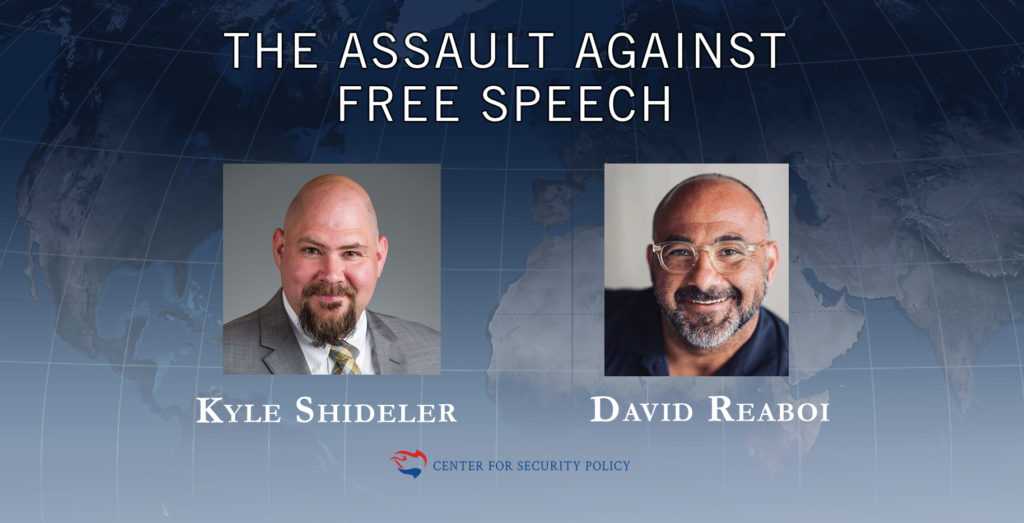Assault on free speech: ‘if you can’t analyze it, you can’t understand it. And if you can’t understand it, you can’t win’
The assault on free speech is deep rooted and threatens national security, two Center for Security Policy experts said in a June 23 webinar. Dave Reaboi, a Center Senior Fellow, and Kyle Shideler, the Center’s Director for Homeland Security and Counterterrorism, discussed how the confluence of Big Tech, government, and threats of violence have created a dangerous threat to American’s First Amendment rights.

The assault on free speech is deep rooted and threatens national security, two Center for Security Policy experts said in a June 23 webinar.
Dave Reaboi, a Center Senior Fellow, and Kyle Shideler, the Center’s Director for Homeland Security and Counterterrorism, discussed how the confluence of Big Tech, government, and threats of violence have created a dangerous threat to American’s First Amendment rights.
Google, they noted, was preparing to de-monetize The Federalist, a popular conservative news and opinion source, at the prompting of leftwing journalists and activists. Reaboi explained how NBC News “laundered” opposition research from a British-based extremist activist site to pressure Google to cancel The Federalist, which has hosted the work of various Center experts.
Shideler noted that Robert Spencer, editor of Jihad Watch and a longtime Senior Fellow at the Center for Security Policy, faced the same technique in a similar campaign of demonetization several years earlier.
‘If you can’t analyze it, you can’t understand it. And if you can’t understand it, you can’t win’
The two discussed how efforts by would-be censors to prevent debate about Islamic ideology in terrorism had a transformative effect on the War on Terror, beginning shortly after the 2001 jihadist attacks in the United States. They talked about a 2006 Danish cartoon controversy in which media censored expression and discussion to pander to Islamist militants.
“We came to the realization that if you can’t speak freely about a threat, you can’t analyze it accurately,” Shideler noted. “And if you can’t analyze it, you can’t understand it. And if you can’t understand it, you can’t win … and that’s why free speech became fundamentally a national security question.”
Reaboi noted the impact of UN Resolution 1618, which sought to criminalize so-called “defamation of religion” – specifically Islam – as a turning point.
“The central premise of [Resolution] 1618 was that it gave away a heckler’s veto,” Reaboi said. “It came as part and parcel to what Hillary Clinton’s State Department was doing at the time in response to the 2012 Benghazi attack. They blamed a movie, and they came out and said, ‘if someone incites you to commit violence, that’s the fault of the inciter.’”
Shideler added, “They inverted the concept of incitement … We sort of assumed this was a standard that existed just in relation to jihadist violence. And what we’ve seen is that this concept has now gone mainstream.”
Shideler recently wrote an article about the impact of this new interpretation of incitement at The American Mind.
In speaking about the growing trend towards censorship on the left, Reaboi harkened back to the work of Herbert Marcuse’s Repressive Tolerance, as a key point where the left began to reject tolerance of all views in favor of censorship of views it opposed.
Click here for the full video of the June 23 webinar.
“Tolerating the expressions of freedom is hateful, and is not appropriate to struggle,” Reaboi paraphrased, “and [Marcuse] pushed the idea of censorship of things that are not on the left. You read him and its really hard not to see the later echoes of the structural racism argument.”
Shideler noted that failing to understand this shift led to challenges in developing coalitions to oppose jihadist violence, despite jihadists targeting and oppressing women and homosexuals, and perpetuating slavery and racism.
Pivoting to the media, Shideler asked Reaboi about an increasingly activist media which has begun to incorporate the tactics of groups like the Southern Poverty Law Center and the Council on American Islamic Relations (CAIR) into their mainstream reporting in order to label and deplatform conservatives. Reaboi noted:
The media is going and picking off the former parts of its supply chain and just putting it all in house. You had a group like SPLC or CAIR… there’s a whole constellation of them, and they would do the opposition research, and then they would go to the media and get it written up. Then other activists would take the article and weaponize it. Now what you’re seeing is all of this happen under one roof. The media is the doxxing unit. The media is the oppo unit…
Reaboi also noted that the growing “wokeness of the media” has hampered efforts to highlight potential threats and raise discussions about policy.
The panelists concluded with the warning that it was unlikely that mainstream media and tech outlets dominated by the left would choose to moderate themselves and return to traditional reporting methods.
Reaboi warned, “the sooner we can dispense with that absurdity the better… and the sooner we can figure out new strategies,” for reaching out to the conservative base and relevant audiences.
- LIVE NOW – Weaponization of US Government Symposium - April 9, 2024
- CSP author of “Big Intel” is American Thought Leaders guest on Epoch TV - February 23, 2024
- Four weeks after release, Big Intel remains a #1 Amazon bestseller - February 13, 2024
